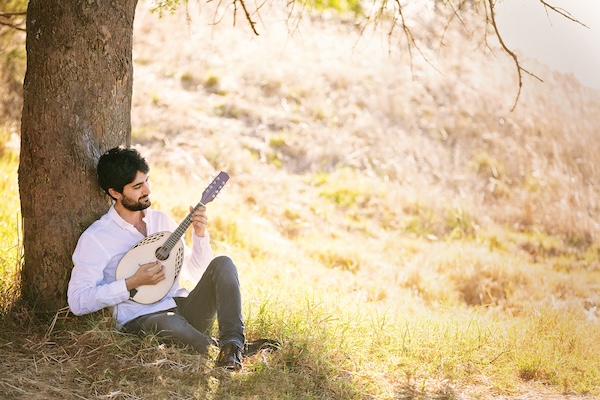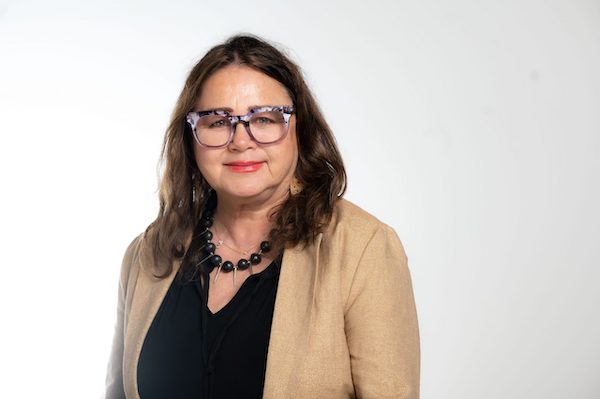Alon Sariel is Early Music Vancouver’s artist in residence for this summer’s festival. (photo by Suzette Vorster-Van Acker)
‘We are thrilled to offer audiences an adventurous program of some of Bach’s seminal works, but with a twist,” said Early Music Vancouver artistic and executive director Suzie LeBlanc in a press release announcing this summer’s early music festival. “From traditional compositions reworked for unique instruments, such as mandolin and oud, to the introduction of vocal improvisation, inspired by Bach’s own customary practice of instrumental extemporization, Bach Untamed welcomes listeners to seek out new perspectives of Bach’s well-known and beloved classics.”
This year’s festival – which runs July 30-Aug. 8 at various venues – features almost 50 emerging and established early music artists from around the world, including mandolinist and multi-instrumentalist Alon Sariel, who is EMV’s 2024 Summer Festival Artist in Residence.
In addition to headlining two concerts – Alon Sariel: Plucked Bach at Congregation Beth Israel on July 31, in which he will premiere his own Bach-inspired Mandolin Partita, and EMV’s festival finale at the Vancouver Playhouse, which features the Canadian premiere of Amit Weiner’s 2019 reconstruction of Bach’s Italian Concerto – Sariel will perform in several other festival concerts, as well as teach a workshop on Bach for plucked instruments.
Sariel, who was born and raised in Beersheba, Israel, met LeBlanc at the Utrecht Early Music Festival, in the Netherlands, last fall.
“I was playing there with friends from Profeti della Quinta, an Israeli vocal ensemble based in Switzerland, who was already a guest of EMV in the past,” Sariel told the Independent. “Suzie and I had a chat and it turned out I had some very different programs to offer and that a residency could be a lovely idea to feature a few of those.”
Sariel’s first visit to Vancouver was more than 30 years ago, as a kid, with his family. He’s excited to return. He arrived July 24 and will be staying until Aug. 9 – “the final concert, Bach & the Mandolin, with the Pacific Baroque Orchestra, is on Aug. 8,” he said.
“The program looks really splendid (a huge shout out to Suzie!) and I’m very glad and proud to wear the artist-in-residence hat this summer – can’t wait really!” said Sariel.
LeBlanc started the artist-in-residence program in 2021 “to create more exchanges between EMV’s guests and the local community.”
“EMV has under its wing a local baroque orchestra – the Pacific Baroque Orchestra, led by Alexander Weimann – and a Baroque Mentorship Orchestra Program (BOMP) at UBC for students and community players,” she explained. “In addition to his own concerts in the summer festival, Alon will collaborate with these ensembles, working with professionals, students and community players, going beyond concert performances and delivering a collaborative and educational experience.
“He will also lead a three-day course called ‘Unconventional Bach,’ which focuses on playing and arranging Bach’s works for different instruments,” she said, noting, “Alon is also a composer and his guiding principle is ‘giving new life to existing material, as well as creating completely new works.’ We’re excited to have an artist in residence who shares this philosophy with EMV and will be so present beyond the concert stage.”
LeBlanc described Sariel’s Bach solos on mandolin as “captivating and very personal.”
“He fully deserves his notoriety as one of the most versatile and gifted mandolin players, lutenists and ensemble directors of today,” she said.
A soloist, chamber player and artistic director, Sariel has performed more than 1,000 concerts in more than 35 countries, according to his bio. In his Plucked Bach recordings (Pentatone), he interprets Bach’s solo music and creates new arrangements for mandolin and lute, the baroque guitar and the oud. His album Telemandolin (Berlin Classics) was awarded an OPUS KLASSIK, making Sariel the first mandolinist to earn the honour. But the path to professional success hasn’t been easy and, said Sariel, “there are still many obstacles in the way of a mandolin player.”
“For any violinist, pianist, conductor, etc., there are many competitions which could serve as a jump step to a musical career – the mandolin has none,” he explained. “I attended several competitions which were open to all instruments and won them all and, even then, I kept getting lines like, ‘Thank you very much for getting in touch, we’ll contact you shall we be interested in the future.’ Booking agencies, record labels and concert halls can still be very suspicious when it comes to the mandolin, that’s why I feel a great responsibility in every concert that I play. It’s not only about me getting re-invited, but it’s about convincing this or that director and, of course, the audience, to give a chance to something new. The theatres could always go for another Rachmaninoff piano concerto or another Beethoven symphony, they don’t have to ‘take a risk’ with a mandolin player, that’s why I really have to stand out in my artistic profile in order to get the chance.”
LeBlanc first heard about Sariel from Renaud Loranger, the artistic director of the Festival de Lanaudière in Québec. When she met Sariel at the Utrecht Early Music Festival, she said, “Our meeting was very pleasant – his playing was fabulous – and I immediately saw that he would be a great and versatile artist in residence. Also, I knew that Vancouverites love the mandolin player Avi Avital, who has played many times in Vancouver. What perhaps they don’t know is that Alon has collaborated with Avi on a recording of Vivaldi’s concerto for two mandolins (Deutsche Grammophon, 2020). I hope all mandolin lovers will come out to hear Alon – he has brought to light many works for the mandolin from centuries past and commissioned composers to write new pieces for him.”
And to think that Sariel wanted to play the electric guitar when he was a kid.
“I wished to learn e-guitar, but I was much too young for that,” he recalled. “The director of the conservatory gave me a little basic test – I had to clap some rhythms and sing some tones, etc. She suggested I should take the violin, but I wasn’t excited. Then she said there’s also the mandolin – which I didn’t know at all – and that it’s in fact ‘very similar’ to the guitar, you hold it pretty much the same way, but the size would be perfect for an 8-year-old. She mentioned the mandolin orchestra and the fact it gets to represent the city occasionally, even abroad, so I agreed to give it a try and thought I’d shift to e-guitar later on. Very soon I forgot about the guitar and was all invested in the mandolin, I absolutely loved it!”
LeBlanc chooses EMV’s artists in residence “first and foremost for their great artistry, for their extensive knowledge of historical performance practice, and their ability to share their ideas and knowledge generously,” she said. Previous artists in residence have been Cree-Métis baritone Jonathon Adams (2021); Scottish Baroque specialists David Greenberg and David McGuiness, violin and keyboard (2022); and Catalina Vicens, keyboard and curator of the Tagliavini Collection of ancient musical instruments in Bologna, Italy (2023).
“It has been extremely rewarding to watch the program grow over the past few years, and hear the enthusiastic audience feedback to our different artists in residence,” she said.
For more information about and tickets to this summer’s festival, visit earlymusic.bc.ca.



